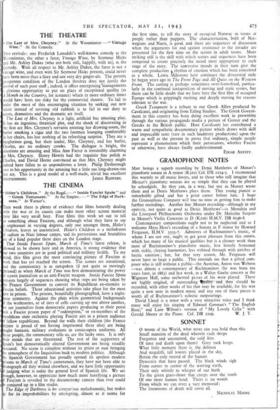THE THEATRE
Two revivals: one Frederick Lonsdale's well-known comedy at the Westminster, the other a farce, Vintage Wine, by Seymour Hicks nd Mr. Ashley Dukes (who are both still, happily, with us), at the Comedy. With all respect to Mr. Ashley Dukes, the farce is not a ,vintage wine, and even with Sir Seymour Hicks present, could never have been more than a fizzy and not very dry ginger-ale. The present
prosperous condition of the London theatres does not justify the revival of such poor stuff ; indeed, it offers enterprising managements a glorious opportunity to put on plays of exceptional quality (as Month in the Country, for instance) which in more ordinary times would have been too risky for the commercial theatre. To fail to make the most of this encouraging situation by seeking out new talent instead of reviving old rubbish is to fail in our duty to actors, dramatists and the dramatic art itself.
The Last of Mrs. Cheyney is a light, artificial but amusing play. It has an ingenious theatrical plot, and the shock of discovering in the first act Mrs. Cheyney's servants entering her drawing-room, the butler smoking a cigar and the two footmen lounging comfortably in her chairs, has lost nothing of its refreshing surprise. They are a burglarious. gang, but their leader, Mrs. Cheyney, and her butler,
harles, are no ordinary crooks. The dialogue is bright, the situations are amusing and Miss Ann Farrer is irresistibly charming as Mrs. Cheyney. Henry Hewitt had the requisite fine polish as Charles, and David Home convinced us that Mrs. Cheyney might indeed have fallen to so unponderous a lover. Philip Desborough rose to his opportunity in the amusing but a little too long-drawn-out last act. This is a good model of a well-made, trivial but excellent


























 Previous page
Previous page